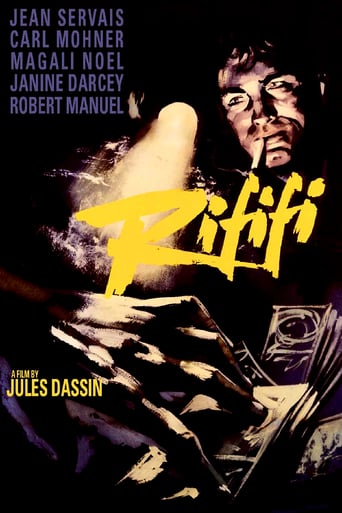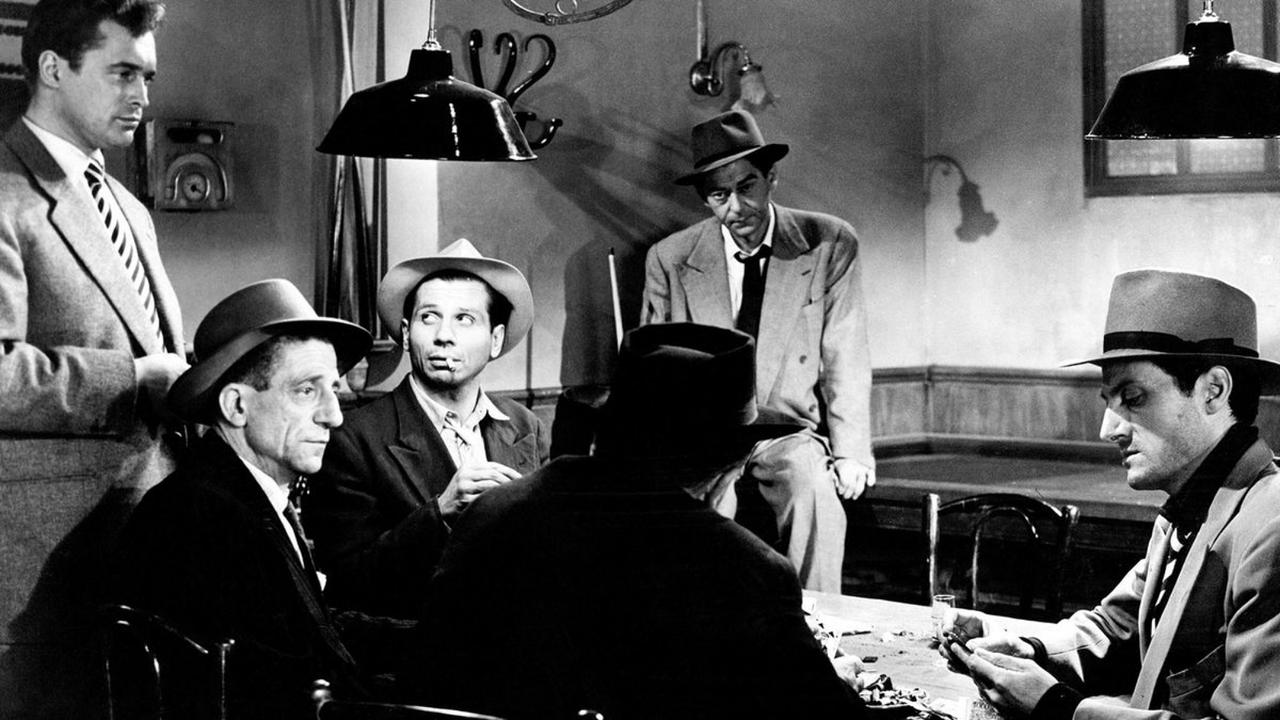JohnHowardReid
Regarded by many critics as the finest film noir ever made, the 1955 Rififi directed by Jules Dassin is available on a 7/10 Criterion DVD. (Why only 7/10? Two image break-ups, including an extended impasse at the beginning of the robbery which undermines this sequence).My personal opinion is that the movie runs far too long and tends to out-stay its welcome, thus allowing the viewer to focus on holes in the plot. For example, I feel trims should have been made to Magali Noel's rendition of the title song, as well as the ailing Jean Servais' climactic drive to Tonio's home, both of which seem to go on forever. The famous, no-dialogue robbery sequence, on the other hand, is commendably taut. Aside from Jules Dassin himself, who, despite his curiosity value, makes an unconvincing Italian romantic, the cast rates as uniformly fine. Servais is especially impressive. Great lighting photography by Agostini and moody sets by Trauner (as well as the inspired use of real Parisian locations) help secure Rififi a place on anyone's must-see list.
Shawn Watson
A group of professionals with their own unique skill sets assemble in Paris to pull of a big heist only for the plan to fall apart when one of them betrays the team for their own selfish desires. Sound familiar? It should, it is a LOT like Ronin. I have no doubt that Frankenheimer and Mamet took a lot of inspiration from this movie 43 years down the line. I think I even recognized some of the locations.62 years is a life time in Metropolitan terms, and the Paris you see in Rififi is far, far removed from the litter-strewn, graffiti covered, overcrowded dump of a city that exists today. For this alone it is worth a watch but the slow burn of the group coming together, meticulously planning their heist, and the 32-minute silence of the heist itself is extremely suspenseful stuff. It loses a little in the final act though, which I do believe could have been about 8 minutes tighter.Jules Dassin made Rififi after being exiled from the US and blacklisted as a Communist (they were not ALL "good old days") and the movie is as masterfully executed as the heist it portrays, which is kind of odd as Dassin's own character in the movie is the reason why it goes sour. The moody black and white photography, real world streets, noir atmosphere make the film a classic in its own right. It's just a shame that not many people would give a chance due to being subtitled.
quinimdb
The greatest scene in "Rififi" is of course the heist scene, but the way each of the characters and each of their fatal flaws causes their downfall in one way or another in the final 45 minutes in the film is right up there with that scene. And the first 45 minutes of the film, which is required to set up the stakes and the tension of the heist scene and the characters and each of their traits that are important in the last third of the film, is also great. OK, so the entire movie is really great, but let's start at the beginning.The film starts by showing a tired looking old man named Tony le Stephanois at a poker table, then running out of money before his friend, Jo, who we learn has a kid and wife, picks him up. He tells him about a possible heist, but turns the opportunity down. We then learn that Tony has just gotten out of prison and is looking for a woman who he used to be with in his life. He finds out she is with another man named Remmie Grutter and has been with another before that since he left, and then he confronts her. He brings her to his house in a very tense scene and whips her with a belt. He kicks her out, and at that moment he calls the man and decides to do the heist. I believe at this moment he realized that this was the man he was, this tough guy, or what we later learn is called a "rififi". But Tony wants to take the heist one step further and steal the mother load, the vault, instead of just taking what's at the store window. And so they begin planning. We learn that they need to pull of the heist before six o'clock so no one witnesses the heist. One of the men goes to the store to scope out the alarm system and the layout of the place. Once they figure out what the alarm system is, they begin experimenting with it in a great, long scene, exhausting every possibility and showing how airtight the system is. This scene is instrumental in establishing most of the tension in the heist scene, because we now know how fragile the alarm system is, and how just barely the wrong move could set off the alarm and ruin the entire heist. Then once they figure out a method of silencing the alarm, they begin the heist.The heist is hands down one of the most intense scenes of all time, and not a single word is spoken. In fact, there is no music or non diegetic sound in this scene in general. But in spite of this, we understand everything that they are trying to do in this scene even though we haven't even heard them outline their entire plan yet, largely due to the fantastic editing and directing. We actually only know what we really need to know in order for there to be tension in this scene, and that is the alarm system and the time that they need to be done. It's a largely silent scene, and this is to emphasize the importance of the noise they make. Too loud, and it's over. This makes every move a risk, and increases the tension with every accidental, or purposeful, sound. We know how sensitive the alarm is to vibration. Hit anything too hard, and it's over. This makes each strike to the ground as they chip through it tense. We know the time they need to be done by, which means each time we get a glimpse of the clock, we grow more and more tense that they won't finish in time. So everything they do in this scene increases the tension, and to top it all off they need to make a FAST get away from two lurking cops near their car.It's a GREAT scene, and a great plan, but the tension isn't over yet, because the plan all comes tumbling down thanks to the various traits we've learned about the character so far. In fact, the cause of each of their downfalls is laid out in the scene where they are each saying what they will do with the money. One says him and his wife can try out beds in all the chic hotels, and his wife's loyalty to him is what gets them both killed in an interrogation scene. One talks about his sisters, and the ring that he gets one of them is what results in Remmie Grutter and his gang finding out about the heist and trying to interrogate and kill Tony's gang for the money. The first thing Jo thinks about is his kid, and his unstoppable drive to get his kid back from Remmie, who takes him as a hostage, is what gets him killed. Tony... well, he doesn't really know. He did this heist because it is what he does, it's what he is. He didn't really think about the money, and he ends up being the last one to die, only after killing Remmie and saving Jo's son by driving him home after he had been shot in the stomach, in another tense scene in which Tony grows dizzier and closer to dying as he drives this car with a young boy in it.
Antonius Block
This smart and gritty French film about a heist does not disappoint. Jean Servais plays a tough guy who has just gotten out of prison and gets an offer to knock off a high-end jewelry store. The opening scenes that establish the four thieves are memorable – Tony (Servais) running out of money while playing cards, Jo (Carl Möhner) and his young family, who will figure prominently in the film, Mario (Robert Manuel) getting bathed by his buxom wife (Claude Sylvain), and Cesar (director Jules Dassin), the expert safecracker who falls for Viviane (Magali Noel) as she sings the playful title song in a nightclub. The club is owned by Grutter, the leader of a gang, and rival for Tony's old girlfriend Mado (Marie Sabouret), and it's these two guys, Grutter and Tony, who will ultimately have to square off. I have to say the early scene in which Tony tracks Mado down and then forces her to completely strip before beating her with a belt (off-screen) is very disturbing, particularly as we're going to find ourselves rooting for him later in the film. It does establish him as a heavy though, loyal to the gang but if betrayed, merciless, which is consistent how he acts later. I can't recall Servais cracking a smile in the entire film, and he plays the role beautifully.The robbery itself is shown masterfully by Dassin. In the planning stages, only a couple of the ways in which the thieves will pull it off are shown, an example of which is figuring out how to use a fire extinguisher to muffle the then state-of-the-art alarm system. The execution of the crime is highly realistic, and I love how he used minimal dialog and music, so that the actions and facial expressions of the actors tell the story. If only there were more films today that took a lesson from him! We also see a flaw that will lead to problems for them, and the film is far from over after the crime – further drama and real tension await, but I won't spoil it.If you're looking for a caper film that among a few others set the blueprint for the genre, this is it. I found out later Dassin had been blacklisted by Hollywood, and was even happier for the triumph of his fantastic direction here. The script is taut, there are no wasted scenes, and on top of it all there are great shots outdoors in Paris. Don't be frightened by the subtitles or by the fact it's black and white and was made in 1955 – it all holds up very well, and is superior to most of the action films of today.


 AD
AD




